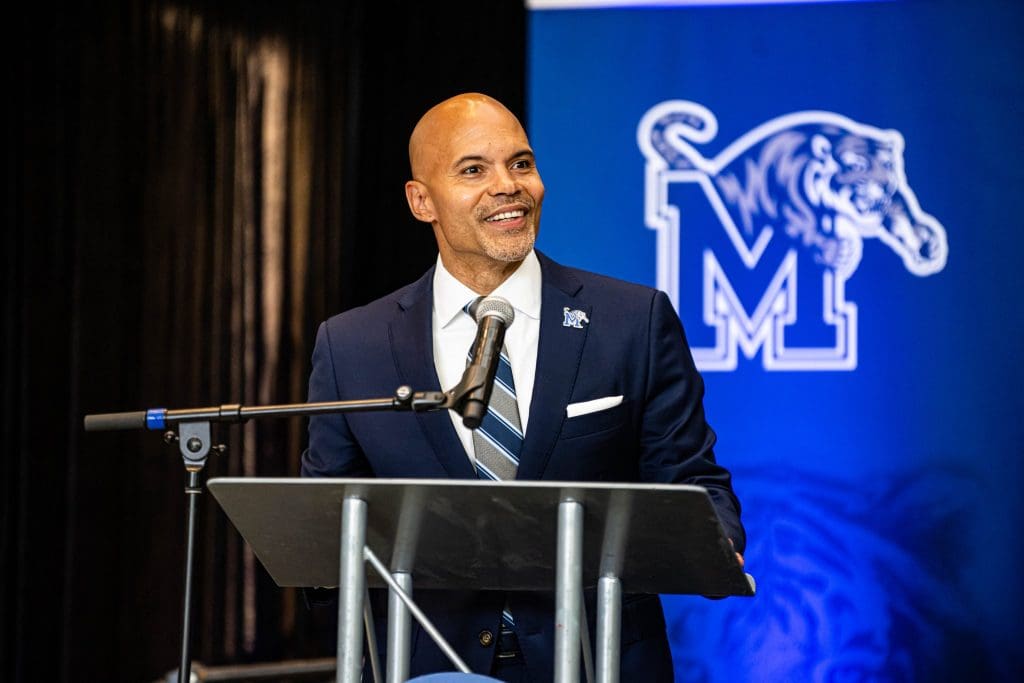The University of Memphis had the opportunity it had been waiting for.
A chance to escape the ever-growing sinkhole that is the American Athletic Conference (AAC), a league that started 11 years ago with aspirations to become a sixth power conference in college sports. It had the arsenal to do it too with the likes of Memphis, Louisville, UConn, Houston, Cincinnati, UCF, Rutgers, SMU, etc.
But of all the schools just listed, Memphis is now the only one remaining. Louisville and Rutgers left for the Big Ten and ACC in 2014. UConn rejoined the Big East in 2020. Houston, Cincinnati and UCF jumped to the Big 12 in 2023, and SMU joined Louisville in the ACC earlier this year.
Most thought Memphis—now in a conference mostly filled with sub-level programs from C-USA—would finally take its chance to bail to the revamped Pac-12 featuring Washington State, Oregon State, Boise State, Colorado State, Fresno State, San Diego State, Gonzaga (non-football) and Utah State. Sure, it’s not a power conference, but it’s a significantly better place on paper than where Memphis is right now.
Memphis would’ve had to make significant sacrifices to make the move happen, though, and athletic director (AD) Ed Scott knew they weren’t worth it. So, Memphis declined the Pac-12’s offer, and recommitted to The American for the foreseeable future Monday.
“That was not a binary decision. That was not a, ‘No, we’re not ever going anywhere.’ That was based on the offer that was presented in front of us. We’re not taking that offer because we don’t think less of ourselves,” Scott told reporters Thursday. “I think sometimes, we get enamored by the new and we wanna take a bad deal. That deal was not a good deal for the University of Memphis. It certainly wasn’t a good deal for our athletic department. And most importantly, it was a really, really bad deal for our Olympic sports.”
Memphis would’ve had to pay $22.5 million of a $25 million exit fee to leave for the Pac-12, which currently has no TV rights deal in place. The school’s travel costs would’ve skyrocketed by more than $2 million, and the travel itself would’ve been harsh on non-revenue sports that normally utilize commercial flights when playing away from home.
Scott approximated that Memphis would’ve only earned a net positive of $500,000 per year in the Pac-12 when factoring everything together.
“Travel wise, it would have to be about 20,000 miles that our [non-revenue sports] teams would have to travel in order to compete with the seven schools that are in there. And that’s if everything was a direct flight, and there’s not a direct flight from Memphis to Corvallis [Oregon] or Memphis to Pullman, Washington,” Scott said. “Do you know how far it is to go around the circumference of the Earth? Just under 25,000 miles…I just don’t think that was the right thing to do based off the finances we had.”
Memphis isn’t the only school that’s turned down the Pac-12 in recent days. Fellow AAC schools Tulane, South Florida and Tulane did as well. So did Mountain West schools UNLV and Air Force.
The Pac-12 needs at least eight FBS members by 2026 to be recognized as an official conference. It only has seven right now, and it’s quickly running out of options with schools rejecting membership left and right.
Scott says he isn’t opposed to revisiting a move to the Pac-12 with better terms, or negotiating with any league for that matter.
“If they call, I’m answering. I’ve never not answered a call when anyone from another school or another conference calls. So, if they call, I’m gonna listen. That’s my job,” Scott said. “We didn’t say no to Memphis’ future. We said no to a deal that we thought was bad.
“I’m not waiting for a promise from Jim Phillips (ACC commissioner) or Brett [Yormark] (Big 12 commissioner). What I am trying to do is be your athletic director, and turn this into the best department we can. We’re a top-30 football and basketball program right now, and we’re willing to compete with anybody. But I’m not gonna go all the way out to the west coast, especially if we made the move ourself and nobody else followed us. Then, we’re gonna go out there with one arm tied behind us in a fistfight.”
As he noted multiple times Thursday, Scott’s vision for Memphis is more about improving the athletic department as a whole instead of simply jumping to a power conference. The latter is obviously a significant goal, but Scott feels that sitting and waiting for an offer is futile.
Especially if said offer can be likened to a scam.
“I’m not hoping for anything. I’m going out trying to earn something. Where I come from, if you hope, you don’t usually get what you want. You gotta go out and do the work, and that’s what I’m doing every day here,” Scott said. “I think more about the City of Memphis, this university and our athletic department than to take a bad deal. While I’m the athletic director at the University of Memphis, I’m not gonna make decisions out of scarcity or desperation. I just don’t think that’s fair to the city. I don’t think it’s fair to our student-athletes, and it’s not fair to the university.
“I just think that’s a short-sided approach to leadership, and that’s not one that we take.”

